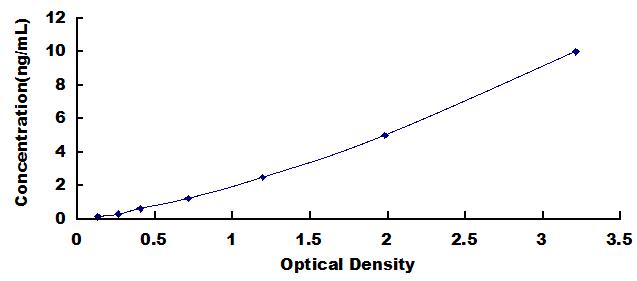Packages (Simulation)

Reagent Preparation

Image (I)
Image (II)
Certificate


ELISA Kit for Beta-Site APP Cleaving Enzyme 1 (bACE1)
ASP2; Beta Secretase; Memapsin 2; Aspartyl protease 2; Beta-site amyloid precursor protein cleaving enzyme 1; Membrane-associated aspartic protease 2
- Product No.SEA718Hu
- Organism SpeciesHomo sapiens (Human) Same name, Different species.
- Sample Typetissue homogenates, cell lysates and other biological fluids
- Test MethodDouble-antibody Sandwich
- Assay Length3h
- Detection Range0.156-10ng/mL
- SensitivityThe minimum detectable dose of this kit is typically less than 0.061ng/mL.
- DownloadInstruction Manual
- UOM 48T96T 96T*5 96T*10 96T*100
- FOB
US$ 441
US$ 630
US$ 2835
US$ 5355
US$ 44100
For more details, please contact local distributors!
Specificity
This assay has high sensitivity and excellent specificity for detection of Beta-Site APP Cleaving Enzyme 1 (bACE1).
No significant cross-reactivity or interference between Beta-Site APP Cleaving Enzyme 1 (bACE1) and analogues was observed.
Precision
Intra-assay Precision (Precision within an assay): 3 samples with low, middle and high level Beta-Site APP Cleaving Enzyme 1 (bACE1) were tested 20 times on one plate, respectively.
Inter-assay Precision (Precision between assays): 3 samples with low, middle and high level Beta-Site APP Cleaving Enzyme 1 (bACE1) were tested on 3 different plates, 8 replicates in each plate.
CV(%) = SD/meanX100
Intra-Assay: CV<10%
Inter-Assay: CV<12%
Stability
The stability of kit is determined by the loss rate of activity. The loss rate of this kit is less than 5% within the expiration date under appropriate storage condition.
To minimize extra influence on the performance, operation procedures and lab conditions, especially room temperature, air humidity, incubator temperature should be strictly controlled. It is also strongly suggested that the whole assay is performed by the same operator from the beginning to the end.
Reagents and materials provided
| Reagents | Quantity | Reagents | Quantity |
| Pre-coated, ready to use 96-well strip plate | 1 | Plate sealer for 96 wells | 4 |
| Standard | 2 | Standard Diluent | 1×20mL |
| Detection Reagent A | 1×120µL | Assay Diluent A | 1×12mL |
| Detection Reagent B | 1×120µL | Assay Diluent B | 1×12mL |
| TMB Substrate | 1×9mL | Stop Solution | 1×6mL |
| Wash Buffer (30 × concentrate) | 1×20mL | Instruction manual | 1 |
Assay procedure summary
1. Prepare all reagents, samples and standards;
2. Add 100µL standard or sample to each well. Incubate 1 hours at 37°C;
3. Aspirate and add 100µL prepared Detection Reagent A. Incubate 1 hour at 37°C;
4. Aspirate and wash 3 times;
5. Add 100µL prepared Detection Reagent B. Incubate 30 minutes at 37°C;
6. Aspirate and wash 5 times;
7. Add 90µL Substrate Solution. Incubate 10-20 minutes at 37°C;
8. Add 50µL Stop Solution. Read at 450nm immediately.
GIVEAWAYS
INCREMENT SERVICES
-
 Single-component Reagents of Assay Kit
Single-component Reagents of Assay Kit
-
 Lysis Buffer Specific for ELISA / CLIA
Lysis Buffer Specific for ELISA / CLIA
-
 Quality Control of Kit
Quality Control of Kit
-
 ELISA Kit Customized Service
ELISA Kit Customized Service
-
 Disease Model Customized Service
Disease Model Customized Service
-
 Serums Customized Service
Serums Customized Service
-
 TGFB1 Activation Reagent
TGFB1 Activation Reagent
-
 Real Time PCR Experimental Service
Real Time PCR Experimental Service
-
 Streptavidin
Streptavidin
-
 Fast blue Protein Stain solution
Fast blue Protein Stain solution -
 Single-component Reagents of FLIA Kit
Single-component Reagents of FLIA Kit
-
 Streptavidin-Agarose Beads
Streptavidin-Agarose Beads
| Magazine | Citations |
| Food & Function | Comparative study of the effects of phosphatidylcholine rich in DHA and EPA on Alzheimer’s disease and the possible mechanisms in CHO-APP/PS1 cells and SAMP8 mice pubmed:29292421 |
| Journal of Functional Foods | EPA enriched ethanolamine plasmalogens significantly improve cognition of Alzheimer's disease mouse model by suppressing β-amyloid generation 10.1016/j.jff.2017.12.016 |
| Journal of Nutritional Biochemistry | Mechanisms of DHA-enriched phospholipids in improving cognitive deficits in aged SAMP8 mice with high-fat diet Pubmed:29986309 |
| Neurotoxicology | Involvement of hippocampal agmatine in β1-42 amyloid induced memory impairment, neuroinflammation and BDNF signaling disruption in mice Pubmed: 32522471 |
| Food Chem Toxicol | Effects of Alcohol Intake on Cognitive Function and ¦Â-amyloid Protein in APP/PS1 Transgenic Mice 33737111 |






